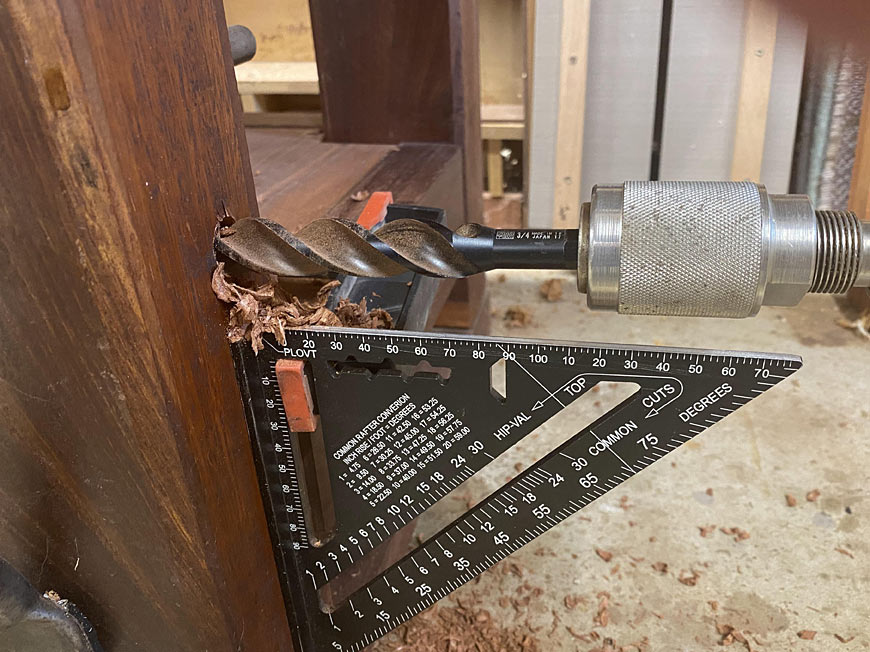There is a technique to using augers in hard wood that I would like to pass on.
What has this to do with hold downs? Well, I have two Gramercy hold downs, and they are great. I also have a single Veritas hold down, and have wanted another as I think that they are the best. But I kept putting off buying one as the Australian Dollar has gone to Hell and they are now really expensive. But, about a week ago I came across two being sold extremely cheaply - the seller was really offering them as a gift - and I was the first to respond. Now I have three!
Storing the Gramercy hold downs has been easy enough. They simply slot into holes in the bench leg ...
The Veritas hold down is more of a problem. They cannot go into a leg like this as they project too far. As a result, the one I have lived in a dog hole on the bench ...
This is not ideal as it takes up wanted real estate. The bench is just 80" long.
I came up with a solution to drill holes in the bench leg, but on the outside, so they face inwards ..
Two issues here: the first is that there is a sliding deadman to consider. This is about 1 1/4" thick Jarrah, as seen in the first photo, and the 3/4" holes must not interfere with it. The second is that, while the holes for the Gramercy hold downs went through 3" of leg, the Veritas holes will need to clear 5" solid Jarrah.
The method here is used by all augers. I have Russell Jennings, Irwin and, as used here, Wood Owl, a Japanese make. The Wood Owl are the best I have used. They have 3 cutting faces verses the 2 on other augers.
The hex shank is, I believe, 7/16" across. This fits the 10" Stanley 2101 Bell brace I am using here.
If you have ever tried to use a brace and auger in hard wood, you will hear recommendations to get augers with fine lead screws (and that coarse lead screws are for soft wood). In my experience, it really makes no difference what you use in really hard woods. For interest, the Jarrah here came from roof trusses rescued when we completed a renovation 15 or so years ago. They had been baking in the West Australian sun for 15 years prior to that (yes, 30 years ago, West Australian home builders were still using Jarrah to build roofs!). Trying to drill through this wood requires a huge amount of down force and forearms like Popeye.
Enter the pilot hole.
The idea is to drill a hole slightly smaller than the lead screw ...
Once this is done - noting that my drill bit was 1" too short to clear the leg - you can begin using the bit and brace ...
The pilot hole provides the lead screw with enough side wall to grip, without also making it create a hole to enter. The force now needed to drill is a tiny percentage of that otherwise need. Below I am just balancing the brace and turning the arm. It feeds itself through the leg ...
Keep drilling until the tip of the lead screw just peeps out the other side ...
Then drill back from this side ...
This prevents spelching (blow out).
The holes are actually very clean. This is the worst - any damage here was actually caused by pulling out the auger bit ...
The edges were chamfered ..



















 Reply With Quote
Reply With Quote




